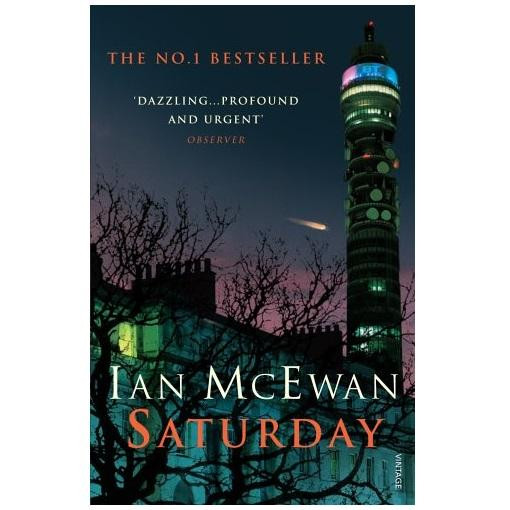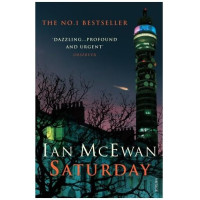- Tovarlar
- Barcha kategoriyalari
- Asboblar
- Avtomobillar, mototsikllar
- Bolalar uchun buyumlar
- Go'zallik va salomatlik
- Kantselyariya mollari
- Kiyim-kechak, poyafzal, aksessuarlar
- Oziq-ovqat maxsulotlari, ichimliklar
- Qurilish
- San'at va hashamat buyumlari
- Sovg'alar, qiziqishlar, kitoblar
- Sport va dam olish
- Texnika va elektronika
- To'y uchun mahsulotlar
- Uy hayvonlari va sotiladigan hayvonlar
- Uy va bog'
- Biznes uchun mahsulotlar
- Xizmatlar


Ian McEwan: Saturday (used)
To'lov usullari:





- Tavsifi
- Xarakteristikalar
- Yetkazib berish
Batafsil tavsif: Ian McEwan: Saturday (used)
Saturday, February 15, 2003. Henry Perowne is a contented man - a successful neurosurgeon, the devoted husband of Rosalind, a newspaper lawyer, and proud father of two grown-up children, one a promising poet, the other a talented blues musician. Unusually, he wakes before dawn, drawn to the window of his bedroom and filled with a growing unease. What troubles him as he looks out at the night sky is the state of the world - the impending war against Iraq, a gathering pessimism since 9/11, and a fear that his city, its openness and diversity, and his happy family life are under threat. Later, Perowne makes his way to his weekly squash game through London streets filled with hundreds of thousands of anti-war protestors. A minor car accident brings him into a confrontation with Baxter, a fidgety, aggressive, young man, on the edge of violence. To Perowne's professional eye, there appears to be something profoundly wrong with him. Towards the end of a day rich in incident and filled with Perowne's celebrations of life's pleasures - music, food, love, the exhilarations of sport and the satisfactions of exacting work - his family gathers for a reunion. But with the sudden appearance of Baxter, Perowne's earlier fears seem about to be realised. Ian McEwan's last novel, Atonement, was hailed as a masterpiece all over the world. Saturday shares its confident, graceful prose and its remarkable perceptiveness, but is perhaps even more dramatically compelling, showing how life can change in an instant, for better or for worse. It is the work of a writer at the very height of his powers.
| ISBN | 978-0-099-46968-5 |
| Язык | на английском |
| Надпись | Латиница |
| Количество страниц | 292 |
| Издательство | Бошқа нашриётлар |
| Тип обложки | Мягкая |
| Формат бумаги | A5 |
| Год издания | 2006 |
Модель: Solar
Texnik xususiyatlari
Yetkazib berish shartlari
Доставка
- Доставка по городу Ташкент составляет - 15 000 сум на малогабаритные товары и 25 000 сум на крупногабаритную технику
- Доставка в ближайшие к Ташкенту районы Ташкентской области (Кибрай, Зангиота, Янгиюль) платная – 10 000 сум (телефоны, мелкая техника и аксессуары), при заказе на крупногабаритную технику доставка считается так: 5000 сум за каждый км от поста ГАИ.
- Доставка осуществляется ежедневно с 11.00 до 21.00, кроме понедельника.
- Заказ на доставку товара к 11.00 оговаривается предварительно и не позднее 17.00 предыдущего дня.
- Срок доставки – от 8 до 48 часов (время доставки зависит от товара), по областям - в течении 3-10 дней.
- При оформлении заказа Покупатель сам выбирает удобное для него время доставки, но не менее 8 часов с момента заказа.
- Если заказ оформлен после 17.00, доставка может быть осуществлена на следующий день.
Условия доставки книг:
- Доставка в городе Ташкент осуществляется в течении 24 часов, стоимость 10 000сум
- Доставка по Узбекистану реализовывается следующим образом:
Фергана, Наманган, Андижан, Джиззак, Самарканд, Навоий, Бухара, Карши, Термез, Ургенч и Нукус - доставка в эти города занимает 2 дня (рабочих), стоимость доставки: 1 книга 10000 сум, 2 книги 15000 сум, 3 книги 20000, 4 и более книг 22000 сум (почта Fargo)
В остальные регионы доставка осуществляется в течении 5 рабочих дней, стоимость доставки: 1 книга 10000 сум, 2 книги 15000 сум, 3 книги 20000, 4 и более книг 22000 сум
Доставка до квартиры
- Подъём на этаж и занос в квартиру:
- малогабаритной техники – бесплатно.
- крупногабаритной техники (холодильник, стиральная машина, газовая плита и т.д.) – от 15 000 до 20 000 сум за каждый этаж (сумма зависит от габаритов техники)
Внимание! Мы не осуществляем подъём на этаж или занос товара в квартиру, если для этого потребуется:
- перестановка мебели или других предметов;
- снятие с петель дверей в помещении;
- демонтаж любых частей товара с целью уменьшения его габаритных размеров;
- расстояние между стороной товара и окружающими предметами или частями помещения при перемещении товара составляет менее десяти сантиметров;
- габариты товара в упаковке превышают размеры лестничных маршей, площадок и входных дверей.
В этом случае товар передаётся Покупателю перед подъездом или перед дверью квартиры, либо в прихожей квартиры, в зависимости от того, где возникло препятствие.
Приём/передача товара
- При получении товара Покупатель обязан внимательно проверить его в присутствии курьера и только после этого произвести оплату наличными или по терминалу.
- Покупатель при приёме товара обязан проверить наличие гарантийного талона на товар.
Обмен и возврат товара
В случае обнаружения заводского дефекта, товары могут быть заменены на аналогичные в течение 10 дней с даты доставки. Товар и упаковка не должны быть повреждены.
Важно!
- Производитель на свое усмотрение и без дополнительных уведомлений Продавца может менять комплектацию, внешний вид, страну производства и технические характеристики модели. Проверяйте соответствие в момент получения товара.
- Сотрудники службы доставки не являются консультантами по товару и не владеют информацией о его конфигурации. В случае необходимости уточняйте интересующую вас информацию о приобретаемом товаре у менеджера по продажам.
sotmoqchimisiz?? Kompaniya yarating



